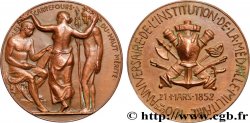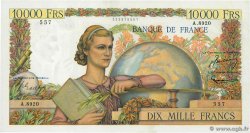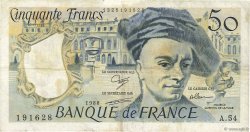fme_588064 - IV REPUBLIC Médaille parlementaire, IIIe législature, Membre honoraire du Parlement
200.00 €(Approx. 234.00$ | 174.00£)
Quantity
Add to your cart

Type : Médaille parlementaire, IIIe législature, Membre honoraire du Parlement
Date: 1956
Mint name / Town : 16 - Charente
Metal : silver
Millesimal fineness : 950 ‰
Diameter : 49,5 mm
Orientation dies : 12 h.
Engraver GUIRAUD Georges (1901-1989) / BARON Roger Bertrand (1907-1994)
Weight : 63,58 g.
Edge : lisse + corne d’abondance 1ARGENT
Puncheon : corne 1ARGENT
Rarity : R3
Coments on the condition:
Patine grise hétérogène avec de petites marques d’usure sur les hauts reliefs. Présence de quelques coups et rayures, entre autre sur la tranche à 3 et 6 heures à l’avers
Obverse
Obverse legend : REPUBLIQUE - FRANÇAISE.
Obverse description : Buste drapé de la République à gauche, une cocarde sur le bonnet, l’Assemblée nationale (Palais Bourbon) en arrière plan ; au-dessous GEORGES / GUIRAUD.
Reverse
Reverse legend : ASSEMBLEE NATIONALE // J. FURAUD / MEMBRE HONORAIRE DU PARLEMENT // LIBERTE EGALITE / FRATERNITE.
Reverse description : Tribune de l’Assemblée nationale reposant sur un cartouche où est inscrit en relief et en deux lignes : ; en bas R. B. BARON.
Commentary
Médaille attribuée à Jacques Furaud en 1956 en tant que membre honoraire du Parlement. Il naquit le 26 février 1889 à Angoulême (Charente) et décéda le 7 novembre 1957 à Péronne (Somme). Il fut élu député de la Charente et siégea lors de la 1re assemblée nationale constituante (21 octobre 1945-10 juin 1946), puis fut réélu député à trois reprises (2 juin 1946-1er décembre 1955). Il se représentera aux élections législatives de 1956 mais n’obtint que 1,9 % des suffrages exprimés. Il décéda dans un accident de la route.
Medal awarded to Jacques Furaud in 1956 as an honorary member of Parliament. He was born on February 26, 1889 in Angoulême (Charente) and died on November 7, 1957 in Péronne (Somme). He was elected deputy for Charente and sat in the 1st National Constituent Assembly (October 21, 1945-June 10, 1946), then was re-elected deputy three times (June 2, 1946-December 1, 1955). He stood again in the 1956 legislative elections but obtained only 1.9% of the votes cast. He died in a road accident.
Medal awarded to Jacques Furaud in 1956 as an honorary member of Parliament. He was born on February 26, 1889 in Angoulême (Charente) and died on November 7, 1957 in Péronne (Somme). He was elected deputy for Charente and sat in the 1st National Constituent Assembly (October 21, 1945-June 10, 1946), then was re-elected deputy three times (June 2, 1946-December 1, 1955). He stood again in the 1956 legislative elections but obtained only 1.9% of the votes cast. He died in a road accident.








 Report a mistake
Report a mistake Print the page
Print the page Share my selection
Share my selection Ask a question
Ask a question Consign / sell
Consign / sell
 Full data
Full data















